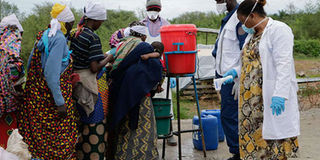In Africa, the patient dog does not necessarily get fattest bone

Repatriated Burundians wash their hands on the border with the DRCongo on March 18, 2020. Burundi has confirmed its first two coronavirus cases on March 31, 2020. PHOTO | ONESPHORE NIBIGIRA | AFP
What you need to know:
- This disproportionate allocation of national resources to the men in arms, and politicians, is always an indicator about where the power the State and president need to survive lies.
- In South Sudan, the leaders of the myriad militias are co-opted by the ruling Sudan People’s Movement/Army to keep the peace and buy support.
- Nothing less than brigadier-general, major-general or general and a fleet of four-wheel-drive cars will do. Rebel chiefs can’t drive ventilators.
The Aga Khan University’s Innovation Centre has these “Understanding Covid-19” webinar series, and this week I was involved in one of them.
The main principal, to use a word much beloved in Kenyan politics, was Ms Winnie Byanyima, the executive director of the Geneva-based United Nations Programme on HIV and Aids (UNAids) and, until last year when she left to take the job, executive director of Oxfam International.
In the two years before that, she was based in Nairobi after Oxfam moved its headquarters to the Green City in the Sun.
You never know the juicy bits that will be thrown out there in these things. There were quite a few. Speaking on the challenge the Covid-19 pandemic poses to healthcare systems in Africa, Byanyima cited the case of South Sudan. She said a colleague had illustrated South Sudan’s dire straits with the example that it had more vice-presidents [five] than ventilators [four] to support people critically ill with the coronavirus. Notably, three out of South Sudan’s five VPs, 10 Cabinet members and all but one of the now-disbanded High-Level Task Force on Coronavirus have tested positive for the virus.
A few days ago, Burundi’s outgoing president Pierre Nkurunziza suddenly died (may his soul rest in peace), officially of a heart attack. However, his wife Denise Bucumi had been admitted to Aga Khan Hospital, Nairobi, with coronavirus, at the end of May. A medical document seen by AFP, the news agency reported, said she had tested positive for the virus and suffered “respiratory distress”. It continued: “A medical source at the Karusi Hospital, where Nkurunziza died, told AFP he had also been in ‘respiratory distress’ before his death.
“A medical source at the Kamenge University Hospital in Bujumbura told AFP that the head of the institute of public health ‘came to requisition our hospital’s only ventilator’. Both were flown to the hospital in Karusi but it was ‘too late; President Nkurunziza was already dead’.”
The image of a sole ventilator being flown around the country to save a dear leader’s life is quite dramatic but it speaks to the old wider problem, as Byanyima said, about where the priorities of our governments lie.
A report last month by The Sentry, an organisation that, according to its description of itself, is an “investigative and policy team that follows the dirty money connected to African war criminals and transnational war profiteers”, drew an eye-popping contrast about the state of South Sudan’s health system. It said South Sudan had more military generals than doctors. With 700 military figures with the rank of general, nationally, that’s about three times as many generals as physicians.
This disproportionate allocation of national resources to the men in arms, and politicians, is always an indicator about where the power the State and president need to survive lies. In South Sudan, the leaders of the myriad militias are co-opted by the ruling Sudan People’s Movement/Army to keep the peace and buy support. Nothing less than brigadier-general, major-general or general and a fleet of four-wheel-drive cars will do. Rebel chiefs can’t drive ventilators.
Sometimes this allocation can be extreme. When Charles Taylor became Liberia’s president in 1997 after the civil war, for most of the early years he was in power, before he resigned in 2003 and was eventually led off in handcuffs to be tried for war crimes, the street on which he lived was the only one with piped water, electricity and street lights in the ruined capital Monrovia.
Oliver Kobusingye is a Ugandan writer and medical doctor. She doesn’t suffer fools gladly and takes life seriously. Last month, she wrote a guest blog for Oxfam Blogs. Noting that Uganda had got a couple of things right in its Covid-19 fight, she bemoaned some of the government’s, and President Yoweri Museveni’s, ‘South-Sudanesque’ tendencies.
Uganda has one of the largest government administrations per population, she wrote. “For its 41 million people, the country has 80 ministers, 426 Members of Parliament, more than 400 salaried presidential advisors.” The president has five times more advisers than cabinet ministers, and nearly equal to the number of MPs. If, in this social-distancing age, they all had to come to meet him, it would require about 15 buses to ferry them.
As the pandemic built up, Parliament held an emergency session and passed a supplementary budget; “a tidy sum of €600 million (Sh72 billion) was to be borrowed from the European Union…and the Legislature obliged. Then the splitting of the money began. “First off, €100 million went to the President’s household as classified expenditure,” she wrote.
In our neck of the woods, it’s not the patient dog that gets the fattest bone. It goes to the most ferocious one.
Mr Onyango-Obbo is a journalist, writer and curator of the Wall of Great Africans. @cobbo3





